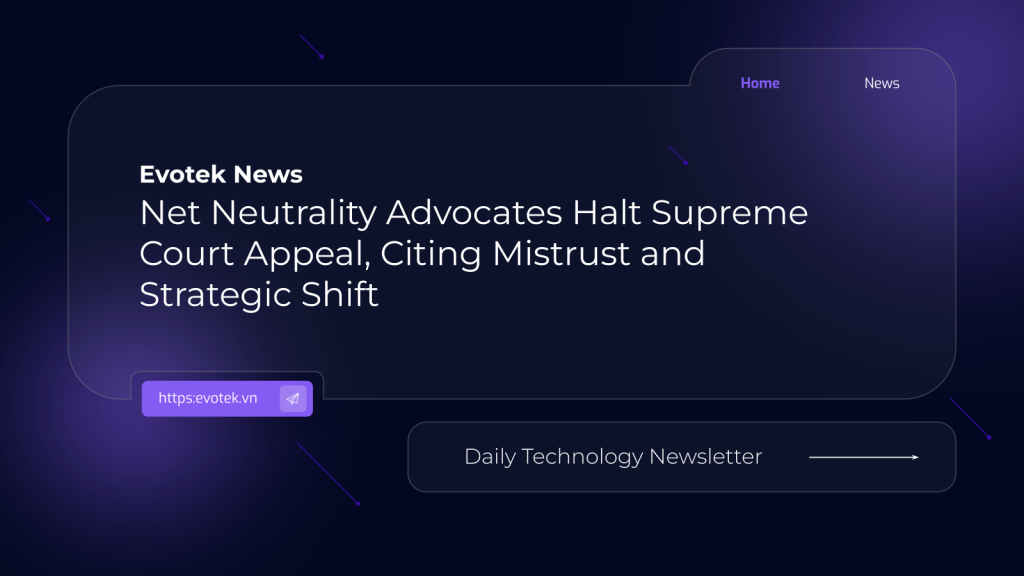A coalition of prominent digital rights and public interest organizations has announced a pivotal decision: they will not appeal a recent court defeat concerning federal net neutrality regulations to the Supreme Court. The groups cite profound distrust in the high court’s impartiality and the current political landscape within the Federal Communications Commission (FCC) as key reasons for their strategic retreat.
The core of the dispute revolves around the classification of broadband internet services. Under the Obama administration, the FCC enacted robust net neutrality rules by classifying broadband as a “telecommunications service” under Title II of the Communications Act, enabling the imposition of common-carrier regulations. These rules prohibited Internet Service Providers (ISPs) from blocking, throttling, or offering paid prioritization for online content. However, these protections were repealed during the Trump administration and subsequently revived under President Biden.
Telecom industry lobbyists promptly challenged the Biden-era restoration, securing a victory at the US Court of Appeals for the 6th Circuit. This ruling classified broadband as an “information service,” significantly limiting the FCC’s regulatory authority over ISPs.
Despite being directly involved in the litigation, advocacy groups like Free Press, the Benton Institute for Broadband & Society, New America’s Open Technology Institute, and Public Knowledge have collectively chosen not to pursue a Supreme Court appeal. Their decision is rooted in a pragmatic assessment of the current judicial and regulatory environment.
Matt Wood, VP of Policy and General Counsel at Free Press, articulated their concerns, stating, “Trump’s election flipped the FCC majority back to ideologues who’ve always taken the broadband industry’s side on this crucial issue. And the justices making up the current Supreme Court majority have shown hostility toward sound legal reasoning on this precise question and a host of other topics too.” He emphasized the futility of an appeal, noting that even a favorable Supreme Court ruling would likely be undone by the current, Republican-led FCC.
Shifting the Battleground for Open Internet Protections
While acknowledging the 6th Circuit’s decision as “spectacularly wrong” and the struck-down protections as “extremely important,” the groups are redirecting their efforts. Instead of petitioning the Supreme Court, they plan to champion internet affordability and openness through legislative battles in Congress, state legislatures, and other judicial proceedings nationwide.
Raza Panjwani, Senior Policy Counsel at the Open Technology Institute, echoed this sentiment: “Though the 6th Circuit erred egregiously in its decision to overturn the FCC’s 2024 Open Internet order, there are other ways we can advance our fight for consumer protections and ISP accountability… we believe our efforts will be more effective if focused on those alternatives.”
Future of Net Neutrality: A Path to the Supreme Court Remains Possible
Despite this specific appeal being abandoned, the door for net neutrality to reach the Supreme Court in a future case is not entirely closed. Andrew Jay Schwartzman, Senior Counselor of the Benton Institute for Broadband & Society, highlighted that the 6th Circuit’s ruling creates a direct conflict with decisions from at least two other circuit courts, including the 2016 District of Columbia Circuit ruling that upheld the Obama-era FCC’s classification. This “circuit split” could eventually compel the Supreme Court to intervene to resolve the inconsistency in federal law.
Moreover, the landscape of internet regulation continues to evolve at the state level. California, for instance, maintains its own robust net neutrality law. Efforts by ISPs to overturn this state legislation have been unsuccessful, with courts affirming states’ authority to regulate net neutrality when federal agencies are not actively doing so. This sets a precedent for localized battles over digital rights and consumer protections.
The decision by these advocacy groups marks a strategic pivot in the ongoing fight for an open internet, signaling a long-term commitment to safeguarding online freedom through diverse legal and political avenues.

 日本語
日本語 한국어
한국어 Tiếng Việt
Tiếng Việt 简体中文
简体中文